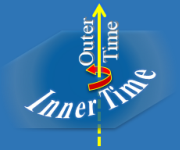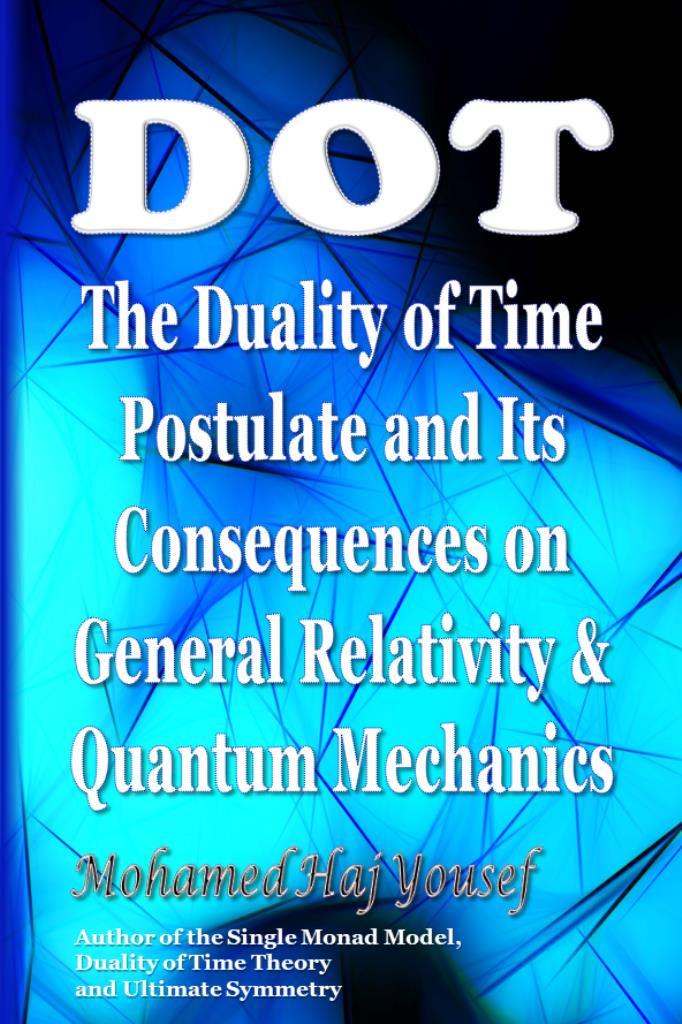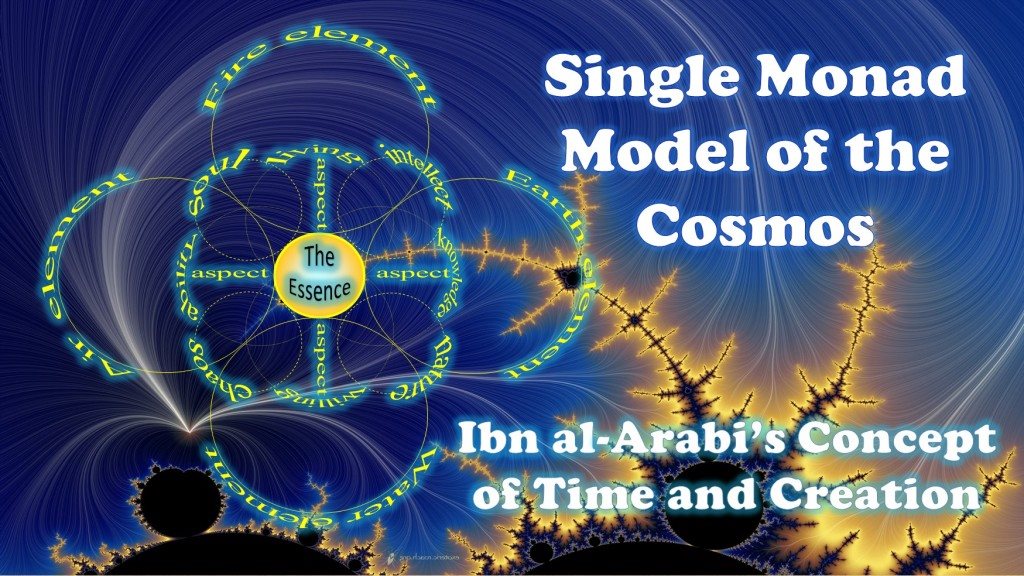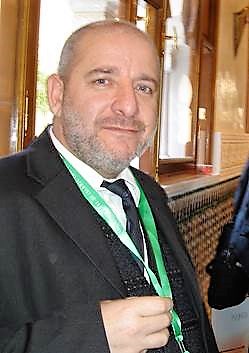Most of these introductory articles are exracted from Volume I of the Single Monad Model of the Cosmos: Ibn al-Arabi's View of Time and Creation... more on this can be found here.
See also: Leibniz and Monadology
Time in Western Philosophy
Aristotle's notion of circular time, based on an eternal (uncreated) universe, could not generally be accepted by most theologians of the three Abrahamic religions - Islam, Christianity and Judaism - insofar as they considered time to be linear, with a definite created beginning and end. St. Augustine, and later Thomas Aquinas, objected to Aristotle's belief that time is circular, insisting instead that human experience is a one-way journey from Genesis to Judgment, regardless of any recurring patterns or cycles in nature. This latter view was later adopted by Newton in 1687, when he represented time mathematically by using a line rather than a circle.
As we noted above, there was already an earlier debate in Greek philosophy as to whether time exists objectively, or is just constructed by our minds. Puzzled about time, St. Augustine concludes that time is nothing in reality, but it exists only in the mind's apprehension of that reality (EP, 'Time', VIII: 126). On the other hand, Henry of Ghent and Giles of Rome both said that time exists in reality as a mind-independent continuum, but is distinguished into earlier and later parts only by the mind. Isaac Newton considered time (and space) as an independent quantity that exists and flows regardless of matter or mind, a view which Leibniz strongly criticized. Leibniz argued that if space is distinct from everything in it, it would have to be completely uniform and homogeneous; thus he reached the conclusion that it is unreal and relative, in anticipation of Einstein's Relativity, though he never put that insight into the form of mathematical equations (Ross 1984: 47).
Newton also rejected Aristotle's linkage between time and motion, when he said that time is something which exists independently of motion and which existed even before God's creation. He argued that time, and space, is an infinitely large 'container' for all events, and that the container exists with or without the events: this is called the 'absolute' theory of time. Leibniz, who adopted the relational view, objected to that and argued that time is not an entity existing independently of events.
In the eighteenth century, Kant said that our mind structures our perceptions so that space always has a Euclidean geometry, and that time has the structure of the infinite mathematical line (Kant 1998: 158-76). This view, however, lost its mathematical support with the discovery of non-Euclidean geometries in the 1820s.[1] In his Critique of Pure Reason, Kant presented, in the first antinomy, two equally plausible arguments that at the end lead to opposing conclusions: the first shows that the world had a beginning in time, while the other shows that the world had no beginning in time. For the second proposition, if we suppose that the world had no beginning in time, then this means that at any particular moment of time, an infinite number of events have passed - but infinity may never be completed. On the other hand, if the world had a beginning in time then all previous times before that beginning have been blank, and there is no any specific reason why the world should have begun at this time in particular. (The same argument was earlier used by Leibniz in support of his relational theory of time.) We shall see in section II.3 how Ibn Arabi gets out of these riddles by criticizing the questions themselves and asserting instead that Allah created (and is continuously and recurrently creating, see section V.6) the world and time together (Kant 1998: 462-63, 470-76, 490-95, 525-28, 536-38).
In a famous article in Mind, McTaggart also argued about the unreality of time. Events, for McTaggart, are capable of being ordered in two ways: either as past-present-future, which he calls A-series, or as 'earlier than'-'later than', which he calls B-series. He then argues that A-series is contradictory, and that B-series doesn't give all that is essential to time, because time also involves change. The A-series view of time is contradictory because, as McTaggart argues, it will lead to the fact that each event can be described (at different times) by future, present and past, because events are always flowing from the future to the past through the present, so at some times an event may be future then it becomes present and then past; while in the B-series it is always before other events or after other events, no matter whether those events are future, present or past (Dyke 2002: 137-52).
On the other hand, there has also been a great debate as to whether time is continuous or a discrete quantity. Most western philosophers think of time as a continuous quantity, but after the advent of Quantum Mechanics the idea of quantum time was revived, although Quantum Theory itself doesn't consider time to be 'quantized' (Mehlberg 1971: 16-71).
============
[1] Euclidean geometry is based on the ideas of Euclid (ca. 300BC), who stated in his book The Elements five postulates on which he based all his theorems. According to these postulates, space is homogeneous like that which we feel on the earth. In modern cosmology and with the highly intensity gravity found near giant stars and galaxies, space can no longer be treated as homogeneous, and therefore a new branch of geometry (non-Euclidean geometry) has been introduced to take into account the curvature of space-time. For information about Euclidean geometry, see: Patrick J. R. (1986) Euclidean and Non-Euclidean Geometry, Cambridge: Cambridge University.
... Space Transcendence Read this short concise exploration of the Duality of Time Postulate: DoT: The Duality of Time Postulate and Its Consequences on General Relativity and Quantum Mechanics ...
... onsidered time to be linear, with a definite created beginning and end. St. Augustine, and later Thomas Aquinas, objected to Aristotle's belief that time is circular, insisting instead that HUMAN EXPERIENCE is a one-way journey from Genesis to Judgment, regardless of any recurring patterns ...
... n the other hand, Henry of Ghent and Giles of Rome both said that time exists in reality as a mind-independent continuum, but is distinguished into earlier and later parts only by the mind. Isaac Newton considered time (and space) as an independent quantity that exists and flows regardless ...
... exracted from Volume I of the Single Monad Model of the Cosmos: Ibn al-Arabi's View of Time and Creation... more on this can be found here . Time in Western Philosophy Aristotle's notion of CIRCULAR TIME , based on an eternal (uncreated) universe, could not generally be accepted by most the ...
... ompletely uniform and homogeneous; thus he reached the conclusion that it is unreal and relative, in anticipation of Einstein's Relativity, though he never put that insight into the form of MATHEMATICAL EQUATIONS (Ross 1984: 47). Newton also rejected Aristotle's linkage between time and mo ...
... that the container exists with or without the events: this is called the 'absolute' theory of time. Leibniz, who adopted the relational view, objected to that and argued that time is not an ENTITY EXIST ing independently of events. In the eighteenth century, Kant said that our mind structur ...
... great debate as to whether time is continuous or a discrete quantity. Most western philosophers think of time as a continuous quantity, but after the advent of Quantum Mechanics the idea of QUANTUM TIME was revived, although Quantum Theory itself doesn't consider time to be 'quantized' (Me ...
... e never put that insight into the form of mathematical equations (Ross 1984: 47). Newton also rejected Aristotle's linkage between time and motion, when he said that time is something which EXISTS INDEPENDENT ly of motion and which existed even before God's creation. He argued that time, an ...
... sent or past (Dyke 2002: 137-52). On the other hand, there has also been a great debate as to whether time is continuous or a discrete quantity. Most western philosophers think of time as a CONTINUOUS QUANTITY , but after the advent of Quantum Mechanics the idea of quantum time was revived, ...
... ter whether those events are future, present or past (Dyke 2002: 137-52). On the other hand, there has also been a great debate as to whether time is continuous or a discrete quantity. Most WESTERN PHILOSOPHERS think of time as a continuous quantity, but after the advent of Quantum Mechani ...
... e of the infinite mathematical line (Kant 1998: 158-76). This view, however, lost its mathematical support with the discovery of non-Euclidean geometries in the 1820s.[1] In his Critique of Pure Reason, Kant presented, in the first antinomy, two equally plausible arguments that at the end ...
... This latter view was later adopted by Newton in 1687, when he represented time mathematically by using a line rather than a circle. As we noted above, there was already an earlier debate in Greek philosophy as to whether time exists objectively, or is just constructed by our minds. Puzzled ...














